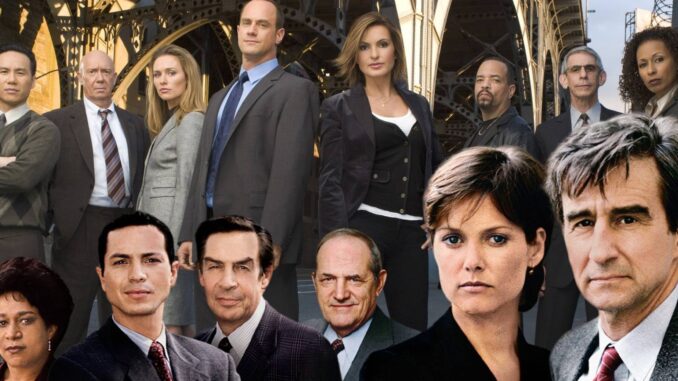
The flickering blue and red lights of a patrol car, the stark silhouette of the New York City skyline, and the unwavering gaze of a woman who has dedicated her life to the broken and the voiceless – for over two decades, that image has coalesced into Olivia Benson, a name synonymous with justice. In a television landscape notoriously fickle, Mariska Hargitay’s portrayal of Captain Olivia Benson in Law & Order: SVU has not merely endured; it has transcended the screen, transforming her into a cultural icon, a beacon of hope, and an enduring symbol of justice in its most compassionate and persistent form. Her longevity is not a mere accident of casting or a testament to a successful franchise; it is a profound reflection of her character’s evolution, her unwavering empathy, and her fearless confrontation of the complex realities of sexual violence and trauma.
From her early days as a determined detective, driven by her own traumatic past, Benson established herself as more than just a cop solving crimes. She was, and remains, a meticulous investigator, but her true power lies in her unparalleled capacity for empathy. She doesn’t just listen to victims; she hears them, often becoming their fiercest advocate within a legal system that can be overwhelming and re-traumatizing. Her interview room is not merely an interrogation space but a sanctuary where victims, often shame-ridden and terrified, find a rare blend of professionalism and profound human understanding. As she ascended the ranks from detective to sergeant, lieutenant, and now captain, her role shifted from direct investigation to systemic change, yet her core ethos remained immutable: to fight for the marginalized, to give voice to the silenced, and to pursue justice with a heart as steely as her resolve. This consistent, evolving dedication to the human element of crime sets her apart, making her a symbol not just of law, but of compassionate justice.
Furthermore, Olivia Benson has become a symbol because she has grown alongside, and often ahead of, societal understanding of sexual assault and domestic violence. SVU has never shied away from exploring the nuanced, often uncomfortable, aspects of these crimes, from the complexities of consent and victim-blaming to the insidious nature of power dynamics. Benson navigates these moral and legal minefields with a clear ethical compass, constantly pushing against outdated prejudices and institutional inertia. She grapples with the grey areas, acknowledging the messy realities of trauma while still adhering to the principles of law. In an era where movements like #MeToo have illuminated systemic failures and the pervasive nature of abuse, Benson’s character embodies the relentless fight for victim agency and accountability. She stands as a fictional but deeply resonant representation of what it means to “believe the victim” while still upholding the tenets of due process, a delicate balance that few characters have managed with such credibility.
Beyond her professional prowess, it is Benson’s enduring humanity, her personal sacrifices, and her own profound vulnerability that cements her iconic status. Viewers have witnessed her suffer immense personal loss, confront her own past traumas, and struggle with the emotional toll of her work, even as she became a mother to her adopted son, Noah. She is not an invulnerable superhero; she is a flawed, resilient woman who carries the weight of countless tragedies on her shoulders, yet refuses to break. This raw authenticity, the visible scars of her devotion, makes her deeply relatable and admirable. It reminds us that justice is not merely an abstract concept or a cold legal process, but a battle fought daily by dedicated individuals who give a piece of themselves to the cause. Her maternal instinct, both for her son and for the countless victims she protects, adds another layer to her identity as a protector and a force for good.
Finally, Olivia Benson’s iconic status is inextricably linked to Mariska Hargitay’s impassioned performance and her real-world advocacy. Hargitay doesn’t just play Olivia Benson; she embodies her, lending the character an authenticity that transcends acting. Her establishment of the Joyful Heart Foundation, dedicated to helping survivors of sexual assault, domestic violence, and child abuse, blurs the line between the fictional character and a real-life champion for justice. This convergence has created a powerful feedback loop, where the character’s influence inspires real change, and the actor’s advocacy further elevates the character’s symbolic weight. When victims speak of “the Benson Effect,” crediting her character with giving them the courage to come forward, it is clear that Olivia Benson has become more than just a character on a TV show; she is a cultural touchstone, a powerful emblem of courage, empathy, and the unwavering pursuit of a more just world.
After more than two decades, Olivia Benson remains a potent symbol of justice not just because she catches the bad guys, but because she embodies the why behind that pursuit. She represents the idea that justice is best served with a profound understanding of human suffering, a willingness to challenge ingrained prejudices, and an unwavering commitment to those who need it most. In a world still grappling with profound inequalities and systemic failures, Olivia Benson stands as a fictional North Star, reminding us that true justice is found in compassion, persistence, and the relentless belief in the possibility of healing and accountability. She is, quite simply, the embodiment of hope for the vulnerable, forever etched into our collective consciousness as the face of unwavering moral courage.
